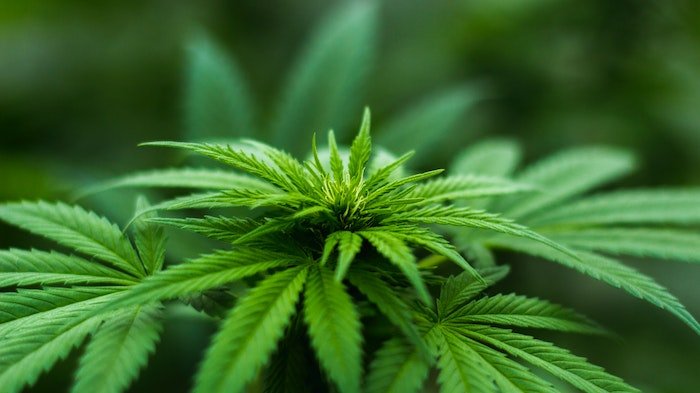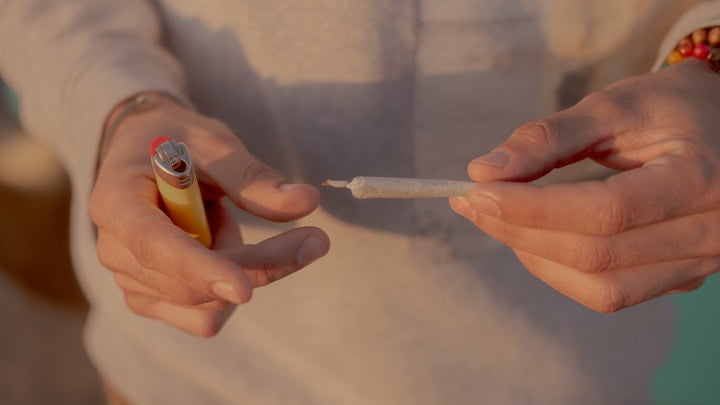Cannabis Addiction Facts: Is Cannabis Physically Addictive?
Cannabis is an addictive substance which affects millions of lives across the world. It comes from the Cannabis Sativa plant, and comes in a dark green mixture of dried flowers which looks similar to herbs.
Cannabis has many different names, and will commonly be referred to as marijuana, hash, herb, weed, pot, bud or ganja across different parts of the world.
There are a few different ways to consume cannabis, including smoking it in a rolled-up joint, or smoking it through a pipe or a bong.
Other people tend to mix their cannabis into food such as cookies or brownies in order to create what are called edibles [1].
Cannabis is not physically addictive but is entirely psychologically addictive. It will affect your mind pretty much straight away.
This is because it contains a chemical called tetrahydrocannabinol (commonly referred to as THC) which is what creates mind-altering effects in your brain [2].
There are now millions of people across the world who use and abuse cannabis, which causes a lot of pain and suffering in many different communities. In fact, a recent study carried out in 2020 highlighted cannabis as the most abused drug in the world [2].
Is Cannabis Addictive?

As discussed above, cannabis is highly addictive. Not everyone who abuses cannabis becomes addicted to cannabis, but those who do abuse cannabis on a frequent basis do become addicted to cannabis relatively easily, without even realising it sometimes.
Millions of people are currently addicted to cannabis across the world, with approximately 14.2 million people being classified as addicted within just one year in 2020 [3,4].
Recent studies suggest that approximately 1 in every 10 people who abuse cannabis become addicted to it. This number grows if you abuse cannabis at a young age [4].
Unfortunately, cannabis use accounts for almost half of all admissions into rehab centres across the UK when it comes to young people [4].
When you are addicted to cannabis, you will experience a range of side effects and will also struggle to function day to day without consuming cannabis [5].
When you suffer from a cannabis addiction, you will experience either mild, moderate or severe symptoms.
You will also experience a range of symptoms including issues with your work life, issues with your relationships, issues at school and negative implications on your finances, physical health and mental well being [3].
When individuals who are dependent on cannabis withdraw from abusing the drug, they will experience a range of rather unpleasant and nasty withdrawal symptoms.
Unfortunately, these withdrawal symptoms can range from very mild to very severe.
The severity of your withdrawal symptoms depends on a number of factors including what drugs you are addicted to, how severe your addiction is, how long you have been addicted to the substance and whether you abuse more than one substance.
Why Is Cannabis Addictive?

Cannabis is an addictive drug due to a number of different factors, including the fact that it is incredibly potent.
However, depending on your tolerance to drugs and other substances, some people do become addicted to cannabis easier than others do.
Some of these reasons are listed and explained further below.
1. Higher Potency Factor
Cannabis is addictive because it is highly potent. This is because it contains plenty of cannabinoids, mainly tetrahydrocannabinol (THC) and cannabidiol (CBD). These are the two chemicals which make you feel high.
With a high demand for cannabis across the UK, more and more suppliers are increasing the potency of their products so that they can create more demand.
Unfortunately, this also means that more people than ever are becoming addicted to cannabis.
This is why cannabis today contains a lot more THC in it than cannabis did just a few years ago. Cannabis in the 1990’s used to contain only 4% THC, whereas now it contains close to 15%.
However, some suppliers are now supplying products made up of solvent based oils, which could mean that your cannabis ends up being up to 80% potent in THC.
2. Age People Begin Smoking
Numerous studies have also now discovered that those who abuse cannabis at a younger age are also more likely to become addicted to cannabis than those who only start to abuse cannabis at an older age.
One study in particular discovered that if you abuse cannabis as young as 14 or 15 years old, then you are significantly more likely to become addicted to cannabis than if you started after the age of 15 or older.
3. How frequently you abuse cannabis
How frequently you abuse cannabis will also affect how likely you are to become addicted to the drug.
If you start to abuse cannabis on a daily or even weekly basis, then you are a lot more likely to become addicted to the drug if you only abuse cannabis once every couple of months.
If you take long breaks in between each use, then you become a lot less likely to become addicted.
If you only have short breaks between each smoke, then you will most likely become addicted to cannabis within the first weeks of using.
4. Genetics
Surprisingly to some, whether you become addicted to cannabis or not could be down to your genetics.
This is because you are more likely to become addicted to cannabis if your parents abused cannabis whilst you were a child.
This is often called ‘genetic liability’ which means that you are born with specific genes that will increase your risk of developing certain diseases, illnesses and addictions.
However, it is important to understand that if your parents abused drugs and alcohol whilst you grew up, your destiny is not written in your starts. In fact, there are a number of other factors that would have more influence over you, including your environment.
5. Mental Health
Your mental health will also influence how likely it is that you will become addicted to cannabis. If you suffer from mental health issues such as depression, anxiety, schizophrenia or bipolar disorder then you are statistically more likely to become addicted to drugs such as cannabis.
You are also more likely to become addicted to cannabis if you suffer from other issues such as ADHD, low self-esteem and social anxiety. If you struggle with your sleep, then you are also more likely to become addicted to drugs such as cannabis.
Signs that someone is addicted to cannabis

There are numerous signs that someone is addicted to cannabis.
Unfortunately, some signs might be harder to detect than others.
These signs usually span behavioural, physical and psychological symptoms, some of which are listed below.
Behavioural symptoms of a cannabis addiction
- Feeling lazy and unmotivated
- Not going to school or work
- Losing interest in certain activities or hobbies
- Struggling to maintain your performance at work or school
- Starting to lie to loved ones and family members
- Changing friendship groups
- Spending more time with other people who also abuse drugs
- Spending more time alone
- Using and carrying drug paraphernalia such as paper rolls, pipes and bongs
- Being unable to stop abusing cannabis, even if you are aware of the negative side effects and effect it is having on you and your family and loved ones
- Using cannabis when you drive or are looking after children
Physical symptoms of cannabis addiction
- Red and bloodshot eyes
- Issues with coordination and balance
- Being excessively tired
- Being excessively sluggish and lazy
- Constantly wanting to go back to bed
- Struggling to concentrate and pay attention
Psychological symptoms of a cannabis addiction
- Issues focussing or think clearly (brain fog)
- Issues with your judgement
- Struggling to track time
- Experiencing mood swings, where you are either extremely high or extremely low in your mood
- Struggling to make decisions, even over the smallest of things
- Feeling increasingly irritated and agitated
- Feeling very paranoid about things, situations and other people
Social symptoms of a cannabis addiction
- Not wanting to spend time with family and friends anymore
- Struggling to make new friends
- Arguing with people more than they usually would
- Struggling to deal with their workload
- Spending more time at home and a lot of time alone
- Losing interest in certain hobbies and activities that they used to love
- Struggling with their finances
People who suffer from an addiction to cannabis will also be at higher risk of developing other problems such as attention issues, memory loss and difficulty with their social life.
The stronger your cannabis is, and the longer you abuse cannabis for, the worse your symptoms and side effects will be.
Unfortunately, scientists are still looking into the full extent of the side effects and symptoms of excessive cannabis use.
However, it is very clear that abusing cannabis on a regular basis has a detrimental effect on your physical, social and psychological health.
Warning Signs & Withdrawal Symptoms

When someone who is addicted to cannabis withdraws suddenly from use of the substance, there will be a number of withdrawal symptoms.
This is because once you become addicted to cannabis, your mind will rely on the cannabis in order to function day to day.
As with any drug, when you stop taking cannabis you will experience a range of withdrawal symptoms, some of which are listed and explained further below [3]:
- Struggling to sleep
- Feeling excessively tired
- Feeling depressed
- Feeling anxious
- Feeling increasingly irritated
- Dramatic mood swings, where you feel either extremely happy or extremely low in your mood
- A complete loss in appetite
- Feeling shaky
- Suffering from severe headaches
When you withdraw from taking cannabis, you might experience these side effects and symptoms straight away, or you might experience them after a few days of initially withdrawing.
Some people with a severe addiction to cannabis tend to experience these withdrawal side effects and symptoms for one or two weeks, whereas those with a less severe addiction to cannabis might only experience these side effects for a number of days [3].
Cannabis’s Effects on the Brain

When you abuse cannabis on a regular basis, you will be damaging your brain. This is because the THC in cannabis has been proven to alter a number of different parts of the brain.
THC has now been proven to target and affect the hippocampus, which is the part of the brain that is responsible for your ability to remember things.
Unfortunately, if you abuse cannabis over a number of years then you are increasing your chances of developing a poor memory as you get older [6].
Numerous studies across the world have also found that excessive cannabis use has been proven to contribute to a range of different learning issues, with people struggling to remember basic facts both in the long and short term.
Another study has also shown that people who abuse cannabis on a regular basis (people who use it at least 7 or more times every week for a number of years) were proven to struggle more with basic maths [7].
In addition to this, the cannabis within your body will almost immediately target the receptors in your brain that are responsible for your coordination, movement and ability to make decisions and judgements.
Cannabis’s Effects on the Lungs

Studies have also now found that smoking cannabis on a regular basis will also damage your lungs, both in the long and short term. This will make it extremely hard for you to live day to day, as you rely on your respiratory system to function, get around and to exercise.
This is because THC has three to five times more tar and carbon monoxide than normal tobacco does.
This will result in a whole host of issues, including excessive coughing and wheezing, and it will make you a lot more prone to picking up infections and other illnesses.
You do not need to abuse cannabis on a frequent basis in order to damage their lungs.
In fact, even just infrequent use of cannabis will result in a range of breathing issues, including a sore throat and a bad cough.
Put simply, anyone who smokes cannabis will be damaging their body and will suffer from a range of respiratory issues, and will be much more likely to get ill from this than people who do not smoke.
Unfortunately, smoking cannabis has also now been linked to cancer.
A recent study that compared cancer patients and non-cancer patients found that smoking cannabis on a regular basis makes you a lot more likely to develop cancer in the throat or neck [8].
Cannabis’s Effect on Your Social Life

Cannabis can also have a very negative effect on your social life. You are more likely to suffer from mental health issues if you are addicted to cannabis, which might contribute to a breakdown in your close friendships and relationships with family members.
You are also a lot more likely to suffer from a lack of motivation when you suffer from an addiction to cannabis, which will make it harder for you to socialise.
You are also a lot more likely to suffer from anger issues when you frequently abuse cannabis, which will also contribute to a breakdown in relationships with friends or loved ones [9].
Treatments for an Addiction to Cannabis

If you think that you are someone you know is addicted to cannabis, then it is important to seek help for your addiction.
There are a range of different treatment options available to those who are addicted to cannabis, which will either be completed within an outpatient rehab facility or through an inpatient rehab clinic.
Lots of people who attend a rehab clinic for the very first time might not have tried rehab treatment before, which is why it is important to keep an open mind.
Below are some of the most popular treatment options available to people in most rehab centres across the UK.
1. Inpatient rehab treatment
If you suffer from a severe addiction to cannabis, then you might be asked to attend an inpatient rehab centre. This will involve moving into a rehab centre for at least a week, where you will undergo a detox and withdrawal from the addictive substance.
Depending on how severe your addiction is, you could end up spending a week, 2 weeks, 4 weeks or even sometimes 6 – 10 weeks in an inpatient rehab treatment centre.
During this time you will also receive a range of different therapy treatments, which will all work towards recovering mentally as well as physically from your addiction to cannabis.
2. Outpatient rehab treatment
If your addiction to cannabis is less severe, then you might only need to attend outpatient rehab treatment. This means that instead of moving into a rehab centre for a number of weeks, you will instead get the chance to recover from your addiction in the comfort of your own home.
You will still need to undergo a detox, which you may receive in the form of a home detox. A home detox is when you withdraw from the addictive substance in the comfort of your own home, but are expected to do so alone.
You may receive medication through the post and will be rang on a daily basis by doctors and therapists to make sure that you are okay and copying with your detox.
The rest of your outpatient treatment journey will be spent visiting a local rehab centre for help and support. Depending on the severity of your addiction, you will have to visit a local rehab centre on a daily or weekly basis.
3. Cognitive Behavioural Therapy
Cognitive behavioural therapy (CBT) is one of the most popular and well known types of therapies, and lots of rehab centres across the UK offer CBT as a therapy technique.
CBT involves one-to-one therapy, usually with a psychotherapist. You will talk about a range of things during CBT, but the aim of CBT is to uncover any previous trauma you might have had, and how your thoughts and feelings influence your behaviours.
4. Holistic Therapy
Holistic therapy is also a really popular treatment option used throughout rehab centres across the world.
Holistic therapy includes a range of different activities, including art therapy, music therapy, yoga, meditation, mindfulness and much more.
The idea behind holistic therapy is that by finding your ‘flow’ you get the chance to relieve stress and anxieties. You are also then more likely to feel relaxed enough to approach and think about your addiction issues.
Aftercare and Support Service for a Cannabis Addiction

Once you leave rehab, you will then be offered a range of aftercare and support services for your recovery.
Unfortunately, lots of people who recover from addictions go on to relapse at a later stage, which is why it is incredibly important to engage in aftercare and support services once you leave rehab.
Once you leave rehab for an addiction to cannabis, you should engage in a number of aftercare and support services, some of which include Narcotics Anonymous, attending SMART recovery meetings, Al Anon family group meetings and other outpatient treatment services.
Speak to Rehab Recovery

If you or a loved one is addicted to cannabis and you think that they might need help, then speak to us today.
Our team of specialists will be able to guide you through the recovery process and point you in the right direction, so that you can get the help that you or your loved one needs.
Start by calling us today on 0800 088 66 86 or by visiting us online on www.rehab-recovery.co.uk for help and support from our team at Rehab Recovery.
References
[1] Substance Abuse and Mental Health Services Administration. (2021, October). Key Substance Use and Mental Health Indicators in the United States: Results from the 2020 National Survey on Drug Use and Health.
[2] Drug Enforcement Administration. (n.d.). Drug Scheduling.
[3] National Institute on Drug Abuse. (2021, April 13). Is marijuana addictive?.
[4] National Institute on Drug Abuse, National Institutes of Health, & U.S. Department of Health and Human Services. (2018, July). NIH Publication No. 18-DA-4036.
[5] American Psychiatric Association. (2013). Diagnostic and statistical manual of mental disorders, Fifth edition (DSM-5). Arlington, VA: American Psychiatric Association.
[6] National Institute on Drug Abuse. Cannabis (Marijuana) DrugFacts. http://www.drugabuse.gov/ResearchReports/Marijuana/Marijuana3.htm
[7] Block, RI and Ghoneim, MM Effects of chronic marijuana use on human cognition. Psychopharmacology. 110(1-2):219-228, 1993
[8] Zhang, Z.-F.; Morgenstern, H.; Spitz, M.R.; Tashkin, D.P.; Yu, G.-P.; Marshall, J.R.; Hsu, T.C; and Schantz, S.P. Marijuana use and increased risk of squamous cell carcinoma of the head and neck. Cancer Epidemiology, Biomarkers & Prevention 6:1071-1078, 1999
[9] Brook, J.S. et al. The risks for late adolescence of early adolescent marijuana use. American Journal of Public Health, October 1999




